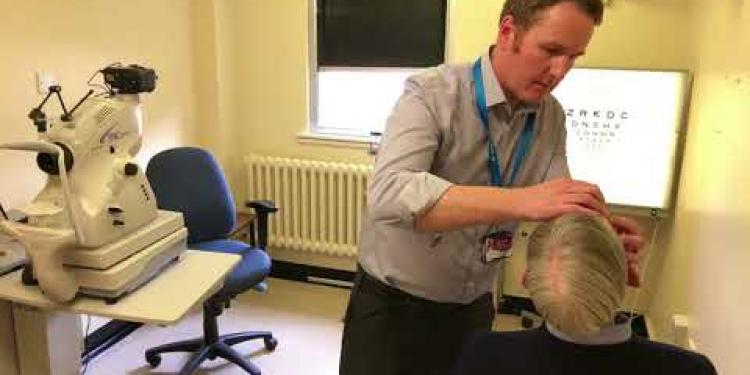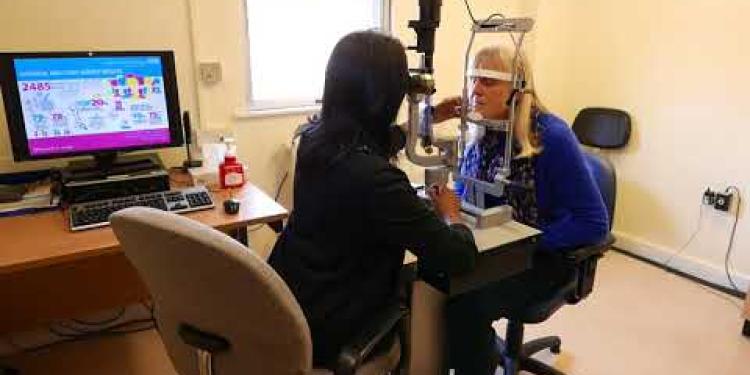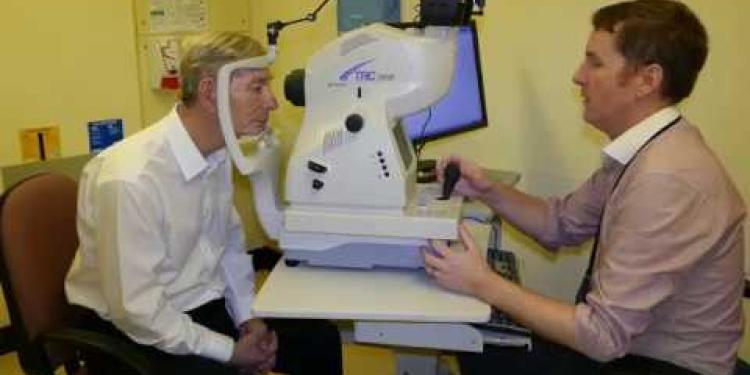Important Information On Using This Service
- Ergsy carefully checks the information in the videos we provide here.
- Videos shown by YouTube after a video has completed have NOT been reviewed by ERGSY.
- To view, click the arrow in the center of the video.
Using Subtitles and Closed Captions
- Most of the videos you find here will have subtitles and/or closed captions available.
- You may need to turn these on and choose your preferred language.
Turn Captions On or Off
- Go to the video you'd like to watch.
- If closed captions (CC) are available, settings will be visible on the bottom right of the video player.
- To turn on captions, click settings.
- To turn off captions, click settings again.
Find A Professional
Diabetes Eye Screening
Introduction
In the United Kingdom, diabetes eye screening is a crucial health service designed to prevent sight loss in people with diabetes. Regular eye screening can detect retinopathy, a condition where high blood sugar levels damage the retina. Early detection through screening can help manage and treat this condition effectively, preventing severe vision problems.
Why is Diabetes Eye Screening Important?
Diabetic retinopathy is a leading cause of blindness in the UK, but it can often be treated if detected early. Eye screening is important because it spots damage before you notice any changes to your sight. Detecting retinopathy early means treatment can be more effective, potentially preventing sight loss.
Who Should Get Screened?
In the UK, everyone aged 12 and over who has diabetes (type 1 or type 2) is invited for diabetic eye screening once a year. This is part of the National Health Service (NHS) Diabetic Eye Screening Programme, which aims to reduce the risk of vision loss among people with diabetes by identifying retinopathy early.
What to Expect During Screening
The screening itself is straightforward and usually takes about 20-30 minutes. It involves a special camera taking photographs of the back of your eyes (retina). These photographs are then examined for signs of retinopathy. The screening is painless, although you may be given eye drops to dilate your pupils, which can cause temporary blurred vision.
After the Screening
Following the screening, the images taken will be analyzed by specialists. Results are typically sent out within a few weeks. If signs of retinopathy are found, you may be referred to a specialist eye service for further assessment and treatment. Regular attendance to these screenings and following up on any necessary treatments can greatly reduce the risk of serious eye complications.
Conclusion
Diabetes eye screening is a vital part of managing diabetes care in the UK. By ensuring regular screening, those with diabetes can protect their eyesight and maintain a better quality of life. For more information, contact your GP or visit the NHS website.
Diabetes Eye Screening
Introduction
In the UK, people with diabetes get a check-up to help keep their eyes healthy. This is called diabetes eye screening. It helps stop problems with your eyesight. The screening looks for damage in your eyes caused by diabetes. Finding problems early means they can be treated.
Why is Diabetes Eye Screening Important?
Diabetes can cause eye damage that can lead to blindness. But if we find it early, it can be treated. Screening looks for eye damage before you notice anything wrong. Finding problems early means treatment works better and can stop you from losing your sight.
Who Should Get Screened?
In the UK, everyone who is 12 years old and older with diabetes should get their eyes checked once a year. This is done through the NHS Diabetic Eye Screening Programme. The goal is to find eye problems early and keep people with diabetes from losing their vision.
What to Expect During Screening
The test is simple and takes about 20-30 minutes. A special camera takes pictures of the back of your eyes. These pictures are checked for problems. The test does not hurt, but you might get eye drops that can make your vision blurry for a short time.
After the Screening
After the test, experts check the pictures of your eyes. You usually get the results in a few weeks. If there are any problems, you may need to see an eye doctor for more tests and treatment. Going to these check-ups and getting the right treatment can help keep your eyes healthy.
Conclusion
Diabetes eye screening is very important for people with diabetes in the UK. Regular check-ups help keep your eyes in good condition and improve your life quality. For more details, talk to your doctor or visit the NHS website.
Frequently Asked Questions
What is diabetic eye screening?
Diabetic eye screening is a test to check for damage caused by diabetes to the retina (back of the eye). Early detection and treatment can prevent vision loss.
Who should go for diabetic eye screening?
Everyone with diabetes over the age of 12 should have regular eye screening tests.
How often should I have a diabetic eye screening?
Individuals with diabetes should have a diabetic eye screening at least once every year.
What will happen during the diabetic eye screening?
During the screening, special eye drops are used to widen your pupils. Photographs of your retina are then taken to look for damage caused by diabetes.
Is diabetic eye screening the same as a regular eye test?
No, diabetic eye screening specifically checks for diabetic retinopathy and other diabetes-related eye issues, whereas regular eye tests check for vision problems and overall eye health.
Do I need to do anything to prepare for the screening?
No special preparation is needed, but you may want to bring sunglasses as the eye drops can make your eyes sensitive to light for a few hours.
Will the diabetic eye screening test hurt?
The screening is painless, though the eye drops may cause slight discomfort and blurred vision temporarily.
Can I drive after the diabetic eye screening?
It's advised not to drive for several hours after the test due to the effect of the eye drops on your vision.
What should I do if I notice changes in my vision before my next screening?
If you notice any changes in your vision, such as blurriness or dark spots, visit your GP or eye care professional immediately.
What are the potential complications of diabetic retinopathy if left untreated?
If untreated, diabetic retinopathy can lead to severe vision loss or blindness.
How is diabetic retinopathy treated?
Treatment options include laser treatment, injections, or surgery to prevent further damage and vision loss.
Is diabetic retinopathy reversible?
Early-stage retinopathy can be managed and progression can be slowed or stopped, but the damage already done is usually permanent.
Are there lifestyle changes I can make to avoid diabetic eye issues?
Maintaining good blood sugar control, dieting, exercising, avoiding smoking, and attending regular screening can help prevent diabetic eye problems.
Are the results of the screening available immediately?
Usually, the results are not immediate. You will receive a letter with your results within a few weeks.
Does the NHS cover the cost of diabetic eye screening?
Yes, the cost of diabetic eye screening is covered by the NHS for all individuals over the age of 12 living with diabetes.
What is diabetic eye screening?
Diabetic eye screening is a test to check your eyes. It helps find problems caused by diabetes. Doctors look at the back of your eye to see if there is any damage.
This test is important because it can stop serious problems. If they find any damage, they can treat it early.
To make the test easy, you can:
- Bring a friend or family member for support.
- Ask the doctor to explain things in a simple way.
- Use pictures or videos to understand more about the test.
Diabetic eye screening is a test to see if diabetes is hurting your eyes. It looks at the back of your eye, called the retina. Finding problems early can stop you from losing your sight.
Who should have an eye check for diabetes?
If you are over 12 years old and have diabetes, you should go for regular eye check-ups.
How often should I have my eyes checked if I have diabetes?
People with diabetes need to have their eyes checked every year. This check is to make sure their eyes stay healthy.
If you have diabetes, ask a doctor to help plan your eye checks. Tell them if you notice any changes in your eyesight.
Ask for pictures of your eyes during the check to help you understand. You can also have someone go with you to help remember what the doctor says.
People who have diabetes should get their eyes checked at least one time every year.
What happens in a diabetes eye check?
When you go for an eye check-up, the doctor puts special eye drops in your eyes. These drops help open your eyes wide. Then, the doctor takes pictures of the back of your eye. This is to see if diabetes has hurt your eyes.
Is a diabetic eye check the same as a regular eye test?
No, they are not the same.
A diabetic eye check looks for signs of damage from diabetes. This can help stop serious eye problems. You might see bright lights or have eye drops for this test.
A regular eye test checks if you need glasses or if your eyes are healthy in general.
If you have diabetes, it is important to have both tests.
You can ask an adult for help if you are unsure.
Using pictures or listening to someone explain can also help understand better.
No, diabetic eye screening is different. It looks for problems in the eyes caused by diabetes, like diabetic retinopathy. Regular eye tests check how well you can see and the health of your eyes.
What should I do to get ready for the test?
You don't need to do anything special to get ready. But you might want to bring sunglasses. The eye drops can make your eyes feel hurt by bright lights for a few hours.
Does the eye test for diabetes hurt?
No, the eye test should not hurt. It helps check the health of your eyes.
If you worry or feel unsure, tell the person doing the test. They want to help you feel good and calm.
If bright lights bother you, wearing sunglasses after the test might help.
The test doesn't hurt. But the eye drops might feel a bit uncomfortable. They might also make your vision a little blurry for a short time.
Can I drive after the diabetic eye test?
Sometimes, your eyes might be blurry after the eye test. It can make it hard to see clearly.
If your eyes are blurry, it is not safe to drive. It is a good idea to have someone with you who can drive you home.
If you need help, ask someone to come with you. You can also use a magnifying glass to help you read. Remember, staying safe is the most important thing.
Don't drive for a few hours after the eye test. The eye drops can make your vision blurry.
What if I see changes in how I see?
If your eyes start to see things blurry or have dark spots, go to your doctor or eye doctor right away.
What can happen if you don't treat diabetic retinopathy?
If you don't get help for diabetic retinopathy, you might have problems with your eyes. This might make it hard to see.
Here are some things that might happen:
- Your eyes might bleed and this can make your vision worse.
- Your eyes might get very weak and stop seeing things clearly.
- You might even lose your vision and not be able to see at all.
- Your eyes might hurt and feel uncomfortable.
It is important to see a doctor to help keep your eyes safe.
If reading is tough, you can:
- Ask someone to read it to you.
- Use tools that read the text aloud.
- Look at pictures or videos to help understand.
If diabetic retinopathy is not treated, it can make you lose a lot of your sight or go blind.
How can we help eyes with diabetic retinopathy?
Doctors help by checking your eyes often.
They use special lights and cameras to look inside your eyes.
If your eyes need more help, doctors can do treatments like:
- Using lasers to fix eye problems.
- Giving medicine with tiny needles.
- Doing surgery to help you see better.
It is important to take care of your diabetes so your eyes stay healthy.
Ask a doctor or nurse for help if you are worried about your eyes.
You can help your eyes get better with different treatments. These include using a laser, getting special shots, or having an operation. These treatments stop your eyes from getting worse and help you keep seeing well.
Can diabetic retinopathy be fixed?
Diabetic retinopathy is an eye problem that people with diabetes can get. It happens when high blood sugar harms the eyes. It's important to see a doctor if you have this problem.
Diabetic retinopathy can be hard to fix, but doctors can help you stop it from getting worse. It's important to take care of your diabetes and see an eye doctor regularly. They can give you treatments and advice.
Some tools and tips that might help include:
- Using reminders to take your medicine on time
- Eating healthy foods and exercising
- Checking your blood sugar levels every day
- Getting help from family, friends, or support groups
When you find out about retinopathy early, you can slow it down or stop it from getting worse. But the parts that are already hurt often can't get better.
Can I change how I live to keep my eyes healthy if I have diabetes?
Yes, there are things you can do to help your eyes stay healthy:
- Eat healthy foods like fruits and vegetables.
- Exercise regularly, like walking or playing outside.
- Check your blood sugar often.
- Visit the eye doctor every year to check your eyes.
- Don't smoke. Ask for help if you need to stop.
Ask a family member or a friend to help you remember these steps.
There are ways to help stop eye problems if you have diabetes. Here are some tips:
- Keep your blood sugar at the right level.
- Eat healthy foods.
- Exercise regularly.
- Don't smoke.
- See your doctor for eye check-ups.
Using a calendar to track doctor visits can be helpful. Apps can remind you to eat healthy and exercise. Ask a friend or family member for support.
Can I see the screening results right away?
The results from the screening test might not be ready straight away. Sometimes, you need to wait a little bit before you can see them.
Support tips:
- Ask someone to help you understand the results.
- Use pictures or drawings to make it clearer.
- Write down any questions you have about the results.
You will not get your results straight away. You will get a letter with your results in a few weeks.
Does the NHS pay for diabetic eye tests?
If you have diabetes, the NHS gives you free eye tests. These tests check your eyes to keep them healthy. If you need help, you can ask a doctor or a nurse.
Yes, the NHS pays for diabetes eye checks for everyone over 12 who has diabetes.
Useful Links
Useful links from: Derbyshire Diabetic Eye Screening - Diabetic Eye Screening
- NHS Diabetic Eye Screening The NHS provides information about diabetic eye screening, explaining its importance, what happens during the screening, and how patients can attend.
- Derby and Derbyshire Diabetic Eye Screening Programme Information from Chesterfield Royal Hospital NHS Foundation Trust about the local Derbyshire Diabetic Eye Screening Programme, including contact details and services offered.
- Diabetes UK - Diabetic Eye Screening Diabetes UK offers guidance and resources for diabetic eye health and explains why regular eye screening is crucial for people with diabetes.
- NHS Inform - Diabetic Eye Screening NHS Inform provides detailed insights into diabetic eye screening, including information on what to expect during the process, how often it should be done, and the benefits of early detection.
Useful links from: Derbyshire Diabetic Eye Screening - Assessment Clinic Appointment
- NHS - Diabetic Eye Screening Programme Information provided by the NHS about the diabetic eye screening programme, explaining who is eligible for screening, what happens during the screening, and why it is important.
- NHS England - Derby and Derbyshire Diabetic Eye Screening Details about the Derby and Derbyshire Diabetic Eye Screening programme from NHS England, including how to book an appointment and what to expect during your visit.
- Diabetes UK - Eye Screening Comprehensive guide by Diabetes UK on diabetic eye screening, including what it involves, how often you should get screened, and how to manage your eye health effectively.
- Derbyshire Healthcare NHS Foundation Trust - Eye Health Information about eye health services provided by the Derbyshire Healthcare NHS Foundation Trust, including details on diabetic retinopathy screening.
Have you found an error, or do you have a link or some information you would like to share? Please let us know using the form below.
- Ergsy carfully checks the information in the videos we provide here.
- Videos shown by Youtube after a video has completed, have NOT been reviewed by ERGSY.
- To view, click the arrow in centre of video.
- Most of the videos you find here will have subtitles and/or closed captions available.
- You may need to turn these on, and choose your preferred language.
- Go to the video you'd like to watch.
- If closed captions (CC) are available, settings will be visible on the bottom right of the video player.
- To turn on Captions, click settings .
- To turn off Captions, click settings again.



